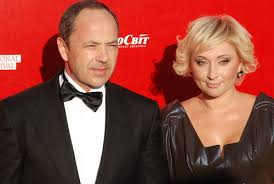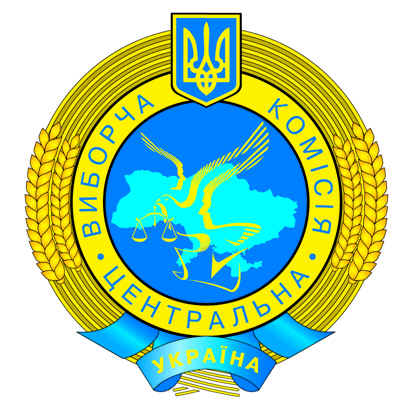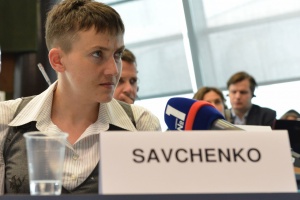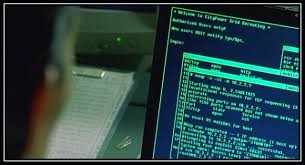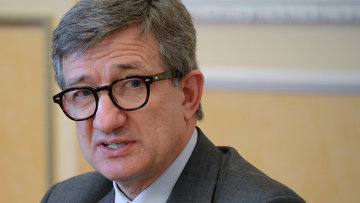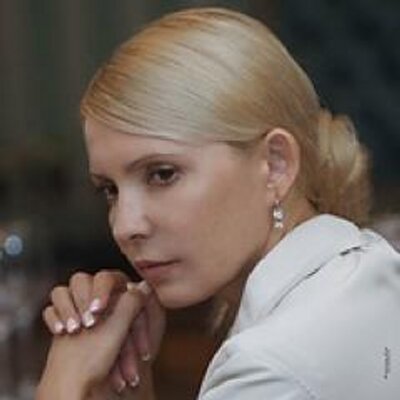Having written about Viktor Pinchuk in the previous entry, this post concentrates on another Dnipro Clan oligarch and long time acquaintance, Sergei Tigipko, who has been spending money recently.
Mr Tigipko it has to be said is an interesting soul whose business activities are somewhat difficult to keep an all-seeing eye upon.
Perhaps he is fated to be that way, for ever since birth Mr Tigipko has not been what he appears to be. Mr Tigipko was actually born on 13th February 1960 – officially, but in fact he was born in the early hours of 14th February. Due to a bureaucratic mix up between medical night shift and morning shift workers the wrong date was officially recorded. It is claimed, similar to Queen Elizabeth II, he therefore has two birthdays, an official one and a real one.
Fair enough – surely all oligarchs can afford to have two birthdays.
In the late 1970’s the family moved from Moldova to Odessa and Mr Tigipko then headed to Dnepropetrovsk and the Metallurgy Institute where (perhaps with the help of a well placed step-father) he became a member of the Komsomol Committee. In true Marxist-Leninist adherence he busied himself with organising discos and supplying the evils of western decadence – Pepsi. It appears that a disco-loving Ihor Kolomoisky was a regular and that they became good friends.
(As an aside Mr Tigipko, or more precisely Mrs Tigipko, retain their interest in Odessa in an act philanthropy annually organising and sponsoring the Odessa International Film Festival – which is actually a very good event.)
Indeed Mr Tigipko has had good fortune in meeting business acquaintances, whilst suffering an equally poor fortune in the world of politics.
A few years of questionable military service and teaching intervene before Mr Tigipko lands the role of chief of psyops/reflexive control when he became the Second Secretary of the (Communist) party and Komsomol committees in Dnipro. Propaganda and agitation commonly being the role of the Second Secretary – a role he was destined to fail at with the date being 1989 and the implosion of the Soviet system only 2 years away.
Nevertheless, having already forged a friendship with Ihor Kolomoisky, it is within the regional Komsomol committee he also meets Olexandr Turchynov (the current head of the Ukrainian national security apparatus and once upon a time, an ardent Tymoshenko ally).
When the Soviet nonsense all eventually crashed, Mr Tigipko had become First Secretary and in charge of the regional Komsomol cash box. He was also by then known to Gennady Tymoshenko who was head of ideological manipulation for the Kirov District. Gennady is the father of Alexander Tymoshenko – the unfortunate husband of Yulia. Indeed it is rumoured that Mr Tigipko played a role in funding Ms Tymoshenko’s video empire back in the day – presumably with Komsomol cash. Controlling that cash, he also came to the attention of Dnepro Regional Council Chairman, the infamous Pavel Lazerenko. He had also made direct acquaintance with (soon to be President) Leonid Kuchma and Viktor Pinchuk.
A reader can now literally see the Dnipro Clan forming.
As the Komsomol system was collapsing Mr Tigipko was swiftly given a senior position within Dnipro Bank – no doubt moving to the position along with the Komsomol regional cash. (There is no reason to believe that events in Dnipro would be any different than those elsewhere in Ukraine at the time when it comes to moving regional Komsomol cash).
Within a year the bank owners were far from getting along well and Mr Tigipko set up PrivatBank with Ihor Kolomoisky, Gennady Bogolyubov, the late Leonid Miloslavsky and Alexie Martynov. From 1992 – 97 Mr Tigipko was Chairman of the Board of PrivatBank – although what share holding he had will probably never been known. What is known is that the initial shareholding was not equal. How much Komsomol/Dnipro Bank cash was used in the creation of Privat is somewhat unclear – and will undoubtedly remain that way.
Meanwhile Mr Kuchma became President Kuchma and Pavel Lazarenko became Prime Minister – leading to a split within the Dnipro Clan and President Kuchma using Mr Tigipko to keep an eye on the out-sized and out of control criminal appetites of Pavel Lazarenko. He becomes Vice Prime Minister for Economic Reforms in order to carry out that task.
(This move obviously ruffled feathers and PrivatBank came under scrutiny for laundering money via its Riga branch. Some things don’t change.)
Whilst in post, Mr Tigipko acted as “roof” for the French cement company Lafarge who then had a few issues with assets in Ukraine. As Bernadette Chirac (wife of Jacques) then sat on the Lafarge board it is perhaps no surprise that Mr Tigipko was awarded French honours personally by Mrs Chirac in 1997.
By 2000 Mr Tigipko wisely quit as the conflict of interests of those around him in the Kuchma government were in all probability intractable at best and very bad for the health at worst.
By 2001 whatever shares in Privat he had were sold for a figure unknown, and he set up on his own with the TAS brand containing banking, insurance, and numerous other interests held under the usual Cypriot holding company – which today is a beast of many tentacles – and is in fact the reason for this entry. (Indeed Mr Tigipko sold one of his banks to Swedbank pre 2008 crisis for $735 million via TAS Overseas Investments (Cyprus)).
If business has been good, politics has not been.
Politically Mr Tigipko did not fare well under Viktor Yushenko and Yulia Tymoshenko. Having chosen the Kuchma side of the Dnipro Clan split, thus backing Yanukovych in 2004/5 elections, that clearly did not sit well with the new “Orange” president, nor a Prime Minister that chose the Lazarenko side of the Dnipro Clan split.
Further when Yanukovych eventually became president in 2010, despite initially welcoming him into the fold, he very clearly and publicly shafted by Mr Tigipko politically.
Lo, tax avoidance aside, it clearly pays in a business sense to hold your assets offshore and in a different legal jurisdiction in a predatory political environment like Ukraine. It is simply far easier to defend and retain your assets.
Under the current president Mr Tigipko has kept his head down making no discernible political moves and very few business moves.
However, in the past few months Mr Tigipko appears to be going on a spending spree domestically. Having recently bought another insurance company and rolled it into his TAS insurance entities, it appears he is now entering the hotel business too.
Not only is he entering the hotel business his seems to be doing getting good deals. For a mere $10 million Mr Tigipko has bought the Radisson Hotel in Kyiv from the Russian owners who for a long time have desperate to sell.
Now a reader may think that the hotel business in Ukraine is not one where returns will be swift – and they’d be right too. There are no swift returns with anything to do with hotels in Ukraine. That said, the price paid for this asset being so low, it is possible he will see a 7 year ROI.
However, it may also be that Mr Tigipko has some insider knowledge regarding the return of licensed gambling in Ukraine and any amended parameters regarding what premises can host casinos – and which can’t. It may well be that the absolute nonsense proposed a year ago for the return of gambling has now had a more sensible eye cast upon it – or is about to have a more sensible eye take a look.
If so, then the Radisson in Kyiv would have additional potential – and a far swifter ROI. As Mr Tigipko has a knack for good business and poor politics, then who would be surprised if that will ultimately prove to be the case?
More generally, does Mr Tigipko now think that the bottom has now been reached and that the small economic bounce is likely to continue in an upward trend, so now is the time to buy?

